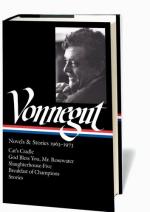|
This section contains 6,194 words (approx. 21 pages at 300 words per page) |

|
SOURCE: Trachtenberg, Stanley. “Counterhumor: Comedy in Contemporary American Fiction.” Georgia Review 27, no. 1 (spring 1973): 33-48.
In the following essay, Trachtenberg discusses the emergence of a dark comic mode in American fiction during the 1960s and 1970s, focusing on common themes in the works of Thomas Pynchon and Kurt Vonnegut.
“Look,” an exasperated Ralph Ellison once demanded of an interviewer whose questions about Invisible Man concentrated on significance, “didn't you find the book at all funny?” Considering what happens in the novel, the question itself seems comic. Real or symbolic episodes of incest, murder, an attempted lobotomy, and a race riot structure a nightmare world in which violence is both a fact of natural existence and part of a mythic role the Negro in America historically has been willing to accommodate. To negotiate this world, the Invisible Man experiences a series of comic transformations. None of them prove finally redemptive...
|
This section contains 6,194 words (approx. 21 pages at 300 words per page) |

|


